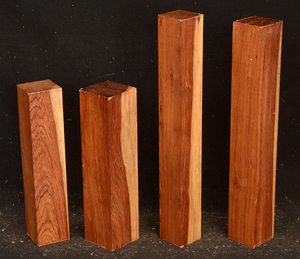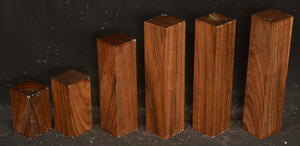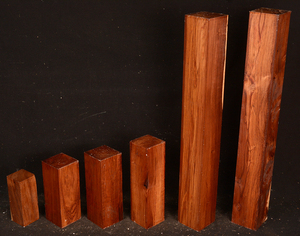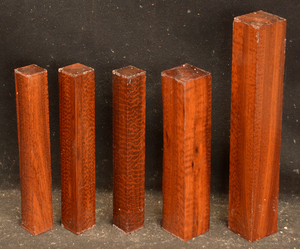Cocuswood Turning Squares
Brya ebenus
This extremely rare species is found in Cuba, Jamaica, and the Dominican Republic. Also called Green, Brown, or West Indian Ebony. The heartwood is brownish-yellow to dark brown often with a greenish tinge. It is usually beautifully veined with darker streaks. The wood is hard and heavy weighing 68 to 80 lbs/cubic foot. This high density contributes to its wonderful acoustic properties-it fairly rings when struck. It is well known for its use in woodwinds such as flutes, piccolos, and bagpipes because of its fine and uniform grain, its beautiful coloring and its resonance.
E has a little wane on one end, should turn off. This piece also has the remnants of cracks we milled off, which means the cracks end at the surface of the square. You can see where they were but they don't go into the piece any farther.
Item Number: W42820
Bird's-eye Maple Turning Square/Pool Cue Blanks
Acer saccharum
The heartwood is white or cream to light brown or reddish brown. Figured somewhat like that of burl with many small eyes separate from each other. Hard and heavy, 45 lbs/cu ft. Easy to work and takes a smooth polish. U.S.A.
Item Number: W42815
Figured Big Leaf Maple Bundles & Turning Squares
Acer macrophyllum
This tree is native to the Pacific Northwest. It has the distinction of having the largest leaf of the Maples-up to 15" in diameter. This is a soft Maple. The tree can produce many different types of figure, including quilted (tubular, popcorn, & cloud), curly (fiddleback, broken, & basketweave), and burl.
A has 3 pieces.
B has 3 pieces.
Item Number: W42797
Camphor Burl Turning Squares
Cinnamomum sp.
This rare burl is from S.E. Asia and is seldom seen on the world market. It is fine-grained and varies in color from a light reddish-brown to almost scarlet. It is easy to work and has a very pungent, spicy scent. For a burl it is remarkably stable. Green to partially air dried.
Item Number: W42776
Camphor Burl Turning Squares
Cinnamomum sp.
This rare burl is from S.E. Asia and is seldom seen on the world market. It is fine-grained and varies in color from a light reddish-brown to almost scarlet. It is easy to work and has a very pungent, spicy scent. For a burl it is remarkably stable. Green to partially air dried.
Item Number: W42775
Camphor Burl Turning Squares
Cinnamomum sp.
This rare burl is from S.E. Asia and is seldom seen on the world market. It is fine-grained and varies in color from a light reddish-brown to almost scarlet. It is easy to work and has a very pungent, spicy scent. For a burl it is remarkably stable. Green to partially air dried.
Item Number: W42755
Pernambuco Turning Squares
Guilandina echinata
Also called Ibirapitanga and Pau Brazil, this once important dyewood gave origin to the name of Brazil. It is now facing extinction over most of its growth area and is listed by CITES as endangered. The color of the heartwood is yellowish-brown to orange and is fine-grained, hard, and heavy. Rare.
Due to CITES regulations, we can only ship this species to customers in the United States.
A has a flamed figure.
C has an inclusion on one face which may or may not turn off
Item Number: W42739
Snakewood Turning Squares
Piratinera guianensis
Also called Letterwood and Leopardwood. Color: dark red to reddish brown with irregular black speckles or stripes. Fine textured and highly lustrous. Very hard and heavy, 75-84 lbs/cu ft. Takes a beautiful finish. Very rare and very expensive. Guyana and Surinam.
Item Number: W42730
New Guinea Striped Ebony Turning Squares/Pool Cue Blanks
Diospyros insularis
This wood originated from a small, sparsely inhabited island off the east coast of New Guinea. Some of these trees grow to enormous dimensions. One of the first logs we received from here was 3 1/2 feet in diameter, 18 feet long, and weighed 7 tons. It is fine-grained and takes a glassy smooth finish. Most of these pieces have a "marble-cake" look to the end grain that is outstanding.
Item Number: W42722
New Guinea Striped Ebony Turning Squares/Pool Cue Blanks
Diospyros insularis
This wood originated from a small, sparsely inhabited island off the east coast of New Guinea. Some of these trees grow to enormous dimensions. One of the first logs we received from here was 3 1/2 feet in diameter, 18 feet long, and weighed 7 tons. It is fine-grained and takes a glassy smooth finish. Most of these pieces have a "marble-cake" look to the end grain that is outstanding.
Item Number: W42721
West African Ebony
Diospyros crassiflora
Sometimes called Gabon or Gaboon, this Ebony is sometimes jet black but oftentimes has grayish streaks that mostly disappear when finished or after the made object has been put into service. This Ebony has a marked resistance to checking that is characteristic of some of the Indian and Asian species. It has a wonderful texture and is easily carved, planed, turned, and milled. It is fairly fine-grained and takes a high polish. This Ebony usually originates in either Cameroon or Nigeria and the logs are rough hewn in the forest and oftentimes brought to the nearest road by human porters. With the disappearance of other species of black Ebony this species is fast becoming the Ebony of choice.
Item Number: W42686
Honduras Rosewood Turning Squares
Dalbergia stevensonii
A true rosewood, most of our stock comes from Belize. Smelling like stored apples, it is a lovely wood to turn and takes a fantastic polish. Getting scarce on the world market.
Due to CITES regulations, we can only ship this species to customers in the United States.
Item Number: W42672
Narra Turning Squares
Pterocarpus indicus
Also called New Guinea Rosewood. It is a beautiful, highly lustrous golden yellow color sometimes with reddish streaks. A nice turning wood it is also used in furniture, jewelry boxes, handles, etc. It is easy to work and glue and takes a nice polish.
Item Number: W42671
Mexican Bocote Turning Squares
Cordia elaeagnoides
Bocote is an oily wood with a yellowish to dark brown color accented with irregular black stripes and streaks. It has a spicy smell and is hard, heavy and strong. It is easy to work and takes a very nice polish. This beautiful wood is seldom seen in woodworker's shops.
Item Number: W42636
Figured Narra Turning Squares
Pterocarpus indicus
This wood is also called New Guinea Rosewood. It is a beautiful, highly lustrous redish-orange color sometimes with darker streaks. The figure is classic bee's-wing mottle. A nice turning wood it is also used in furniture, jewelry boxes, handles, etc. It is easy to work and glue and takes a nice polish.
Item Number: W42626
Black Palm Turning Squares
Astrocaryum & Borassus sp.
These are large palms, often up to 70 or 80 feet tall found in Asia, Central America and West Africa. When first felled they are often split into long beams and are used locally for canoes and drums. The wood, especially in older trees, is very hard and durable and consists of numerous fine, black fibers crowded densely together and surrounded by lighter colored, less dense material. The end grain gives the effect of lizard or snake skin. The densest wood is found on the outside of the trees and gets progressively softer towards the middle. Locally it is used for roof beams, bridges, and telephone poles, and is resistant to salt water, termites, and fungi. It takes a fine polish and is used for walking sticks, decorative handles, and boxes.
Item Number: W42612
Snakewood Turning Squares
Piratinera guianensis
Also called Letterwood and Leopardwood. Color: dark red to reddish brown with irregular black speckles or stripes. Fine textured and highly lustrous. Very hard and heavy, 75-84 lbs/cu ft. Takes a beautiful finish. Very rare and very expensive. Guyana and Surinam.
D has a waney corner.
Item Number: W42566
Camphor Burl Turning Squares
Cinnamomum sp.
This rare burl is from S.E. Asia and is seldom seen on the world market. It is fine-grained and varies in color from a light reddish-brown to almost scarlet. It is easy to work and has a very pungent, spicy scent. For a burl it is remarkably stable. Green to partially air dried.
Item Number: W42545
Shedua Turning Squares
Guibourtia sp.
Also called Ovangkol and Amazakoue. This wood is increasingly becoming popular as an acoustic guitar wood. The color varies from a rich, golden brown to a lustrous grayish brown usually with a black stripe.
Item Number: W42544
Guatemalan Rosewood Turning Squares
Dalbergia tucarensis
This Rosewood species has a reddish-brown to dark brown colored heartwood contrasting the almost white sapwood. The dust has a sweet odor. It is an excellent furniture/case works/jewelry box wood and even though it has a medium texture it does take a nice polish. We also offer it as a musical instrument wood (see guitar fingerboards and backs & sides elsewhere on the site). It has a very "crisp" tap tone with good sustain.
Due to CITES regulations, we can only ship this species to customers in the United States.
Item Number: W42543
Guatemalan Rosewood Turning Squares
Dalbergia tucarensis
This Rosewood species has a reddish-brown to dark brown colored heartwood contrasting the almost white sapwood. The dust has a sweet odor. It is an excellent furniture/case works/jewelry box wood and even though it has a medium texture it does take a nice polish. We also offer it as a musical instrument wood (see guitar fingerboards and backs & sides elsewhere on the site). It has a very "crisp" tap tone with good sustain.
Due to CITES regulations, we can only ship this species to customers in the United States.
Item Number: W42542
Mexican Bocote Turning Squares
Cordia elaeagnoides
Bocote is an oily wood with a yellowish to dark brown color accented with irregular black stripes and streaks. It has a spicy smell and is hard, heavy and strong. It is easy to work and takes a very nice polish. This beautiful wood is seldom seen in woodworker's shops.
Item Number: W42506
Brazilian Bloodwood Turning Squares
Brosimum paraense
Also called Satine, Cacique, and Cardinalwood. The heartwood is a rich strawberry red, in sharp contrast to the light colored sapwood. Takes a high, lustrous finish.
Item Number: W42497
Brazilian Bloodwood Turning Squares/Pool Cue Blanks
Brosimum paraense
Also called Satine, Cacique, and Cardinalwood. The heartwood is a rich strawberry red, in sharp contrast to the light colored sapwood. Takes a high, lustrous finish.
Item Number: W42496
Honduras Rosewood Turning Squares
Dalbergia stevensonii
A true rosewood, most of our stock comes from Belize. Smelling like stored apples, it is a lovely wood to turn and takes a fantastic polish. Getting scarce on the world market.
Due to CITES regulations, we can only ship this species to customers in the United States.
Item Number: W42485
West African Ebony Turning Squares Bundles
Diospyros crassiflora
Sometimes called Gabon or Gaboon, this Ebony is sometimes jet black but oftentimes has grayish streaks that mostly disappear when finished or after the made object has been put into service. This Ebony has a marked resistance to checking that is characteristic of some of the Indian and Asian species. It has a wonderful texture and is easily carved, planed, turned, and milled. It is fairly fine-grained and takes a high polish. This Ebony usually originates in either Cameroon or Nigeria and the logs are rough hewn in the forest and oftentimes brought to the nearest road by human porters. With the disappearance of other species of black Ebony this species is fast becoming the Ebony of choice.
A has 3 pieces.
B through F all have 4 pieces each.
Item Number: W42456
West African Ebony Turning Squares
Diospyros crassiflora
Sometimes called Gabon or Gaboon, this Ebony is sometimes jet black but oftentimes has grayish streaks that mostly disappear when finished or after the made object has been put into service. This Ebony has a marked resistance to checking that is characteristic of some of the Indian and Asian species. It has a wonderful texture and is easily carved, planed, turned, and milled. It is fairly fine-grained and takes a high polish. This Ebony usually originates in either Cameroon or Nigeria and the logs are rough hewn in the forest and oftentimes brought to the nearest road by human porters. With the disappearance of other species of black Ebony this species is fast becoming the Ebony of choice.
Item Number: W42453
Honduras Rosewood Turning Squares
Dalbergia spruceana
This is a fairly rare species from the Amazon region of Brazil. The heartwood varies from a golden-brown to a reddish-brown often with narrow, dark stripes. It is hard and heavy, but easy to work, and takes a high polish.
Due to CITES regulations, we can only ship this species to customers in the United States.
Item Number: W42449
Honduras Rosewood Turning Squares
Dalbergia spruceana
This is a fairly rare species from the Amazon region of Brazil. The heartwood varies from a golden-brown to a reddish-brown often with narrow, dark stripes. It is hard and heavy, but easy to work, and takes a high polish.
Due to CITES regulations, we can only ship this species to customers in the United States.
Item Number: W42448
Chakte-viga Turning Squares
Guilandina sp.
Found in the Yucatan Peninsula in Mexico and related to Pernambuco (Guilandina echinata). It is sought after for house posts in Mexico as it is said to be impervious to termites and other insect pests. It is a lovely light to dark orange color, is fairly hard and heavy, and is capable of taking a very high polish. Rare.
Item Number: W42439
Chakte-viga Turning Squares
Guilandina sp.
Found in the Yucatan Peninsula in Mexico and related to Pernambuco (Guilandina echinata). It is sought after for house posts in Mexico as it is said to be impervious to termites and other insect pests. It is a lovely light to dark orange color, is fairly hard and heavy, and is capable of taking a very high polish. Rare.
Item Number: W42438
Pink Ivory Turning Squares
Berchemia zeyheri
A fairly rare wood from Southern Africa ranging in color from light pink to watermelon red. At one time it was described as being "rarer than diamonds". It is very dense, hard and heavy and takes a very high polish. Beautiful for turnery, inlays and other precious items.
Item Number: W42402
Honduras Rosewood Turning Squares
Dalbergia stevensonii
A true rosewood, most of our stock comes from Belize. Smelling like stored apples, it is a lovely wood to turn and takes a fantastic polish. Getting scarce on the world market.
Due to CITES regulations, we can only ship this species to customers in the United States.
Item Number: W42395
Figured Narra Turning Squares/Pool Cue Blanks
Pterocarpus indicus
Also called New Guinea Rosewood. It is a beautiful, highly lustrous golden yellow color sometimes with reddish streaks. A nice turning wood it is also used in furniture, jewelry boxes, handles, etc. It is easy to work and glue and takes a nice polish.
Item Number: W42370
Figured Red Narra Turning Squares
Pterocarpus indicus
Also called New Guinea Rosewood. It is a beautiful, highly lustrous golden yellow color sometimes with reddish streaks. A nice turning wood it is also used in furniture, jewelry boxes, handles, etc. It is easy to work and glue and takes a nice polish.
Item Number: W42369
Figured Red Narra Turning Squares
Pterocarpus indicus
Also called New Guinea Rosewood. It is a beautiful, highly lustrous golden yellow color sometimes with reddish streaks. A nice turning wood it is also used in furniture, jewelry boxes, handles, etc. It is easy to work and glue and takes a nice polish.
Item Number: W42366
Snakewood Turning Squares
Piratinera guianensis
Also called Letterwood and Leopardwood. Color: dark red to reddish brown with irregular black speckles or stripes. Fine textured and highly lustrous. Very hard and heavy, 75-84 lbs/cu ft. Takes a beautiful finish. Very rare and very expensive. Guyana and Surinam.
Item Number: W42343
Snakewood Turning Squares
Piratinera guianensis
Also called Letterwood and Leopardwood. Color: dark red to reddish brown with irregular black speckles or stripes. Fine textured and highly lustrous. Very hard and heavy, 75-84 lbs/cu ft. Takes a beautiful finish. Very rare and very expensive. Guyana and Surinam.
Item Number: W42342
Chakte-viga Turning Squares
Guilandina sp.
Found in the Yucatan Peninsula in Mexico and related to Pernambuco (Guilandina echinata). It is sought after for house posts in Mexico as it is said to be impervious to termites and other insect pests. It is a lovely light to dark orange color, is fairly hard and heavy, and is capable of taking a very high polish. Rare.
Item Number: W42338
Chakte-viga Turning Squares
Guilandina sp.
Found in the Yucatan Peninsula in Mexico and related to Pernambuco (Guilandina echinata). It is sought after for house posts in Mexico as it is said to be impervious to termites and other insect pests. It is a lovely light to dark orange color, is fairly hard and heavy, and is capable of taking a very high polish. Rare.
Item Number: W42337
Honduras Rosewood Bundle & Turning Squares
Dalbergia stevensonii
A true rosewood, most of our stock comes from Belize. Smelling like stored apples, it is a lovely wood to turn and takes a fantastic polish. Getting scarce on the world market.
Due to CITES regulations, we can only ship this species to customers in the United States.
A has 3 pieces.
Item Number: W42289
Ziricote Turning Squares
Cordia dodecandra
Ziricote is another timber we get from the Yucatan Peninsula of Mexico. It is a lovely wood with a very pronounced ray fleck on radial surfaces sometimes producing a "landscape" effect much like picture jasper.
Item Number: W42276
Honduras Rosewood Turning Squares
Dalbergia stevensonii
A true rosewood, most of our stock comes from Belize. Smelling like stored apples, it is a lovely wood to turn and takes a fantastic polish. Getting scarce on the world market.
Due to CITES regulations, we can only ship this species to customers in the United States.
Item Number: W42260
West African Ebony Turning Squares
Diospyros crassiflora
Sometimes called Gabon or Gaboon, this Ebony is sometimes jet black but oftentimes has grayish streaks that mostly disappear when finished or after the made object has been put into service. This Ebony has a marked resistance to checking that is characteristic of some of the Indian and Asian species. It has a wonderful texture and is easily carved, planed, turned, and milled. It is fairly fine-grained and takes a high polish. This Ebony usually originates in either Cameroon or Nigeria and the logs are rough hewn in the forest and oftentimes brought to the nearest road by human porters. With the disappearance of other species of black Ebony this species is fast becoming the Ebony of choice.
Item Number: W42246
Honduras Rosewood Bundle & Turning Squares
Dalbergia stevensonii
A true rosewood, most of our stock comes from Belize. Smelling like stored apples, it is a lovely wood to turn and takes a fantastic polish. Getting scarce on the world market.
Due to CITES regulations, we can only ship this species to customers in the United States.
A has 3 pieces.
Item Number: W42242
West African Ebony Turning Squares
Diospyros crassiflora
Sometimes called Gabon or Gaboon, this Ebony is sometimes jet black but oftentimes has grayish streaks that mostly disappear when finished or after the made object has been put into service. This Ebony has a marked resistance to checking that is characteristic of some of the Indian and Asian species. It has a wonderful texture and is easily carved, planed, turned, and milled. It is fairly fine-grained and takes a high polish. This Ebony usually originates in either Cameroon or Nigeria and the logs are rough hewn in the forest and oftentimes brought to the nearest road by human porters. With the disappearance of other species of black Ebony this species is fast becoming the Ebony of choice.
Item Number: W42239
West African Ebony Turning Squares
Diospyros crassiflora
Sometimes called Gabon or Gaboon, this Ebony is sometimes jet black but oftentimes has grayish streaks that mostly disappear when finished or after the made object has been put into service. This Ebony has a marked resistance to checking that is characteristic of some of the Indian and Asian species. It has a wonderful texture and is easily carved, planed, turned, and milled. It is fairly fine-grained and takes a high polish. This Ebony usually originates in either Cameroon or Nigeria and the logs are rough hewn in the forest and oftentimes brought to the nearest road by human porters. With the disappearance of other species of black Ebony this species is fast becoming the Ebony of choice.
C has wane on one corner.
Item Number: W42238
West African Ebony Turning Squares
Diospyros crassiflora
Sometimes called Gabon or Gaboon, this Ebony is sometimes jet black but oftentimes has grayish streaks that mostly disappear when finished or after the made object has been put into service. This Ebony has a marked resistance to checking that is characteristic of some of the Indian and Asian species. It has a wonderful texture and is easily carved, planed, turned, and milled. It is fairly fine-grained and takes a high polish. This Ebony usually originates in either Cameroon or Nigeria and the logs are rough hewn in the forest and oftentimes brought to the nearest road by human porters. With the disappearance of other species of black Ebony this species is fast becoming the Ebony of choice.
Item Number: W42237
West African Ebony Turning Squares/Pool Cue Blanks
Diospyros crassiflora
Sometimes called Gabon or Gaboon, this Ebony is sometimes jet black but oftentimes has grayish streaks that mostly disappear when finished or after the made object has been put into service. This Ebony has a marked resistance to checking that is characteristic of some of the Indian and Asian species. It has a wonderful texture and is easily carved, planed, turned, and milled. It is fairly fine-grained and takes a high polish. This Ebony usually originates in either Cameroon or Nigeria and the logs are rough hewn in the forest and oftentimes brought to the nearest road by human porters. With the disappearance of other species of black Ebony this species is fast becoming the Ebony of choice.
Item Number: W42236
Honduras Rosewood
Dalbergia stevensonii
A true rosewood, most of our stock comes from Belize. Smelling like stored apples, it is a lovely wood to turn and takes a fantastic polish. Getting scarce on the world market.
Due to CITES regulations, we can only ship this species to customers in the United States.
Item Number: W42214































































































